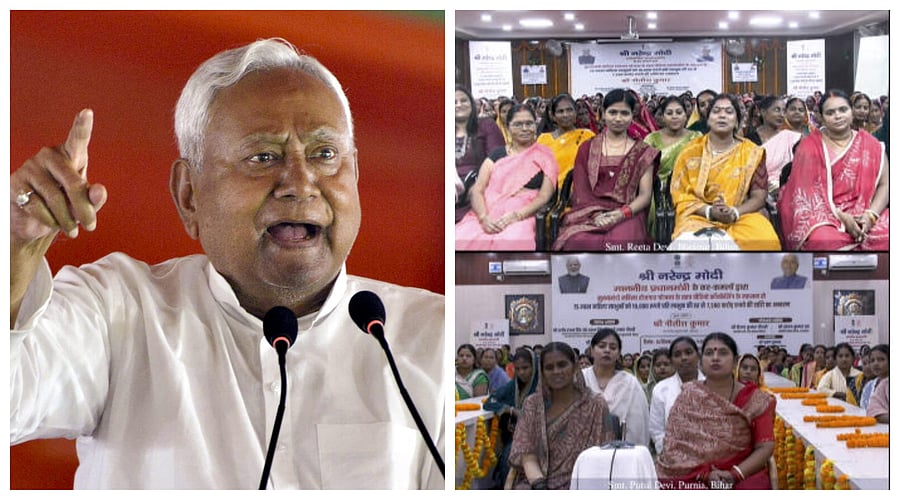
Bihar Chief Minister Nitish Kumar and (R) women at the launch of Mukhyamantri Mahila Rojgar Yojana.
Credit: PTI File Photos
New Delhi: Once again, the women voters of Bihar have been a decisive factor in bringing Nitish Kumar back to power. As the NDA cements its claim to power with a historic victory, the stamp of approval among women voters is undeniable.
For the past five Assembly elections in Bihar now, Election Commission data shows that voting percentage among women have outnumbered that among men. But this term, the gap between the voting percentages of men and women has set a record. For the first time, the voting percentage among women (71.6%) was over 8.8 percentage points more than that of men (66.91%), even though in absolute terms, number of men outnumbered women by 42.3 lakh.
In about seven districts, women outvoted men by more than 14 percentage points and by over 10 percentage points in 10 districts. Patna was the only exception, with men outnumbering women.
Despite a perceived anti-incumbency, the women vote — which has been generous with both Prime Minister Narendra Modi and Nitish over the years — have worked for the NDA. Barring the first election where he was elected the Chief Minister in 2005, voting percentages among women have always outnumbered those of men in Bihar. Nitish has invested in the women vote with schemes such as the Jeevika Didi Yojana and moves like liquor ban.
Veteran journalist and political analyst Radhika Ramasheshan says that women have been a decisive factor in Bihar since the time Nitish Kumar announced prohibition. “The initial capital has since been enhanced by Nitish with reservation for women, offering bicycles etc, with actual results on the ground,” she says, adding that while prohibition has its critics, women have pointed to lesser instances of domestic violence cases.
This term, their populist offering of Rs 10,000 to every eligible women to help them start self-employment activities under the Mukhyamantri Mahila Rojgar Yojana has cemented this loyalty, especially after Prime Minister Narendra Modi launched the scheme by transferring the amount directly to the bank accounts of 75 lakh women in September 2025.
Ramasheshan says that the move is a big one. “It is significant as it has the potential to create a whole block of women entrepreneurs,” she said.
BJP OBC Morcha general secretary and party spokesperson Nikhil Anand said that while there is no denying that women emerged as the biggest support for the NDA Alliance, it is not only the Rs 10,000 which worked in their favour. “Giving 50% reservation to women in the panchayati system, 35% reservation in jobs to women, and the Jeevika system of one crore 20 lakh women consisting of 12-13 lakh self-help groups etc have gone a long way. The scholarship and bicycle for girls have also worked in our favour. We have done the work, and so when the grand alliance tried to lure women voters by offering something surprising, they did not believe them,” he said.
Political analyst and author Rasheed Kidwai, however, said that such populist moves give a ruling party or coalition an edge, which is not entirely ethical. “Women-centric schemes on the eve of polls give an unfair advantage to the ruling party or coalition. It is against the grain of free and fair polls. In the Westminster model of parliamentary democracy, there is more emphasis on issues of prosperity than legality of it,” Kidwai said.